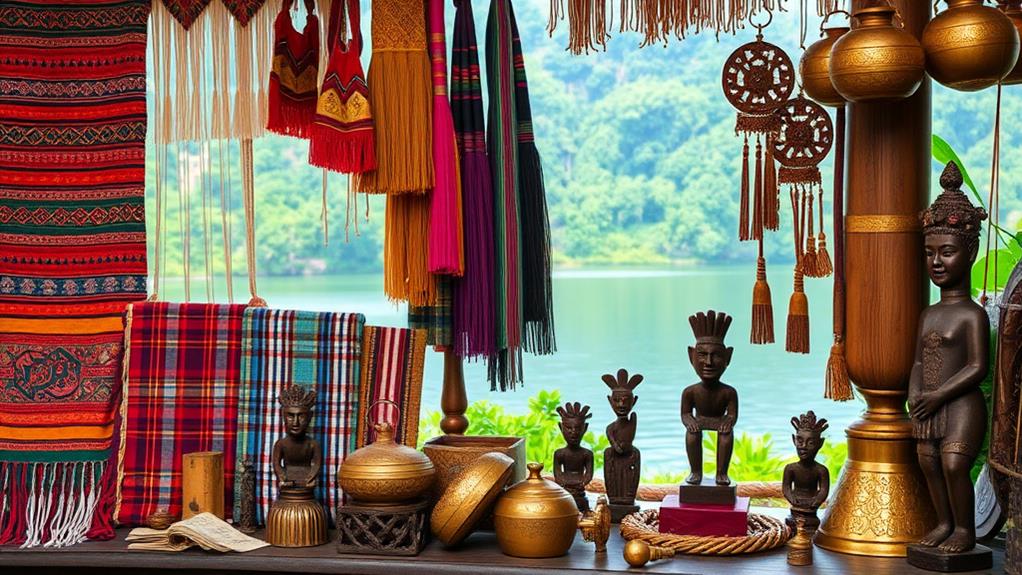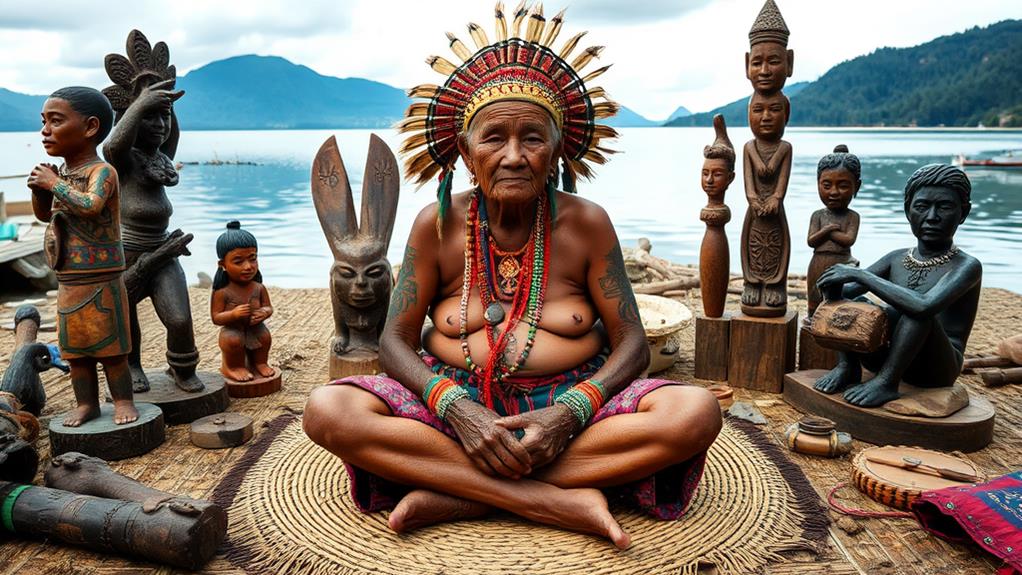Lake Sebu: A Window into T'boli Culture
Lake Sebu is home to the T'boli people, who are known for their vibrant traditions and customs. To experience their rich cultural heritage, you can immerse yourself in local practices. For instance, you can learn the intricacies of Tnalak weaving, a traditional textile art form that requires patience and skill. Additionally, you can indulge in traditional T’boli cuisine and partake in their lively music and dance performances. Furthermore, you can expand your cultural exploration by exploring the culture of Maranao, another indigenous group in the region known for their unique traditions and crafts. By taking the time to engage with the T’boli and Maranao communities, visitors can gain a deeper understanding and appreciation for the rich cultural tapestry of Lake Sebu.
You can also participate in traditional dances, which are an integral part of T'boli celebrations and ceremonies.
Indulge in Local Cuisine
Lake Sebu offers a range of local delicacies, such as stewed tilapia and eggplant salad. These dishes are not only delicious but also provide a glimpse into the T'boli people's culinary traditions.
Engage with the Community
You can engage with the local community by teaching Tboli writing, weaving, and performing arts to the youth. This exchange program allows you to share your skills while learning about the T'boli way of life.
You can also participate in the Helobung Festival, a cultural celebration that showcases the T'boli people's music, dance, and art.
Unravel the Secrets of T'boli Culture
As you delve deeper into T'boli culture, you'll discover the significance of their arts, crafts, and traditional music.
You'll learn about the importance of these cultural expressions and how they are passed down from generation to generation. By engaging with the T'boli people, you'll unravel the secrets of this indigenous heritage, gaining a deeper appreciation for their way of life.
Discovering Tboli Traditions

Tboli Traditions: A Rich Cultural Heritage
The Tboli people are known for their rich cultural practices and customs that are deeply rooted in their daily lives. Their intricate Tnalak weaving is a prominent tradition, where patterns inspired by dreams are created from abaca fibers and dyed primarily in red or black. This intricate process takes approximately six months to complete a single pattern.
Traditional Tboli dances and music performances are essential to their cultural celebrations. These performances showcase their rich heritage through the use of traditional instruments such as the two-string guitar, drum, and bamboo zither.
Tboli cuisine features local staples such as tilapia, corn, and sweet potatoes. Traditional meals are often served on woven bamboo mats using large leaves as plates, fostering community interaction during dining experiences.
The Tboli School of Living Traditions is a hub for cultural preservation. Indigenous youth engage in learning Tboli arts, crafts, and traditional practices at this school, ensuring the continuation of their heritage.
Immersing in Local Culture
Experience Tboli Culture through Immersion
Lake Sebu offers numerous opportunities to delve deeper into the heart of Tboli culture through immersion in local traditions and practices.
Stay in a Traditional Gono Bong
Stay in a traditional gono bong at the Tboli School of Living Traditions, where you can participate in activities like traditional beadwork, meal preparation, and cultural performances. This allows you to experience the indigenous Tboli culture firsthand.
Engage with Local Youth
Engage with local youth through programs that teach Tboli writing, weaving, and performing arts, promoting cultural preservation for future generations.
Savor Local Cuisine
Savor local ingredients and dishes, such as stewed tilapia and eggplant salad, highlighting the community's close ties to nature and sustainable practices.
Participate in the Helobung Festival
Participate in the Helobung Festival, featuring traditional dances, Tnalak fabric showcases, and community events that celebrate Tboli heritage.
Immerse in Local Way of Life
Immerse yourself in the local way of life, fostering a deeper understanding of Tboli customs and practices, and creating unforgettable memories of your time in Lake Sebu.
Tboli Arts and Crafts

The Tboli people's exceptional craftsmanship is evident in their renowned Tnalak weaving, a traditional craft made from abaca fibers dyed in red and black. This intricate textile takes around six months to complete and sells for approximately Php 800.00 per yard.
The Tnalak cloth isn't only a stunning craft but also a cultural symbol, reflecting the artistry and tradition of the Tboli.
Beyond weaving, the Tboli people's craftsmanship extends to exquisite metalworks, such as intricately designed bracelets, anklets, and decorative combs adorned with mirrors and brass rings.
Traditional beadwork is also significant, with artisans creating vibrant necklaces and accessories that hold cultural value.
The Tboli people's artistic expression also includes traditional music and dance, which play a vital role in community events and cultural celebrations. This makes their arts and crafts a true reflection of their rich cultural heritage.
Community Engagement Activities
Preserving Cultural Heritage through Community Engagement
One of the most effective ways to preserve the rich cultural heritage of the Tboli people is through community engagement activities that foster a sense of ownership and pride among the younger generation.
Experiencing Community Engagement
Visit the School of Living Traditions: On weekends, local kids gather at the School of Living Traditions to learn Tboli traditions and arts, play games, and listen to storytelling.
This is a great opportunity to observe and participate in the preservation of Tboli culture.
Traditional Performances: During community events, local children showcase their talent and pride in their cultural heritage by performing traditional Tboli dances and music.
Cultural Exchanges: The School of Living Traditions also hosts cultural exchanges, where you can share experiences and learn from other cultures, such as those from Northern Luzon and Ojibwe.
Helobung Festival: Join in the Helobung Festival, a celebration of Tboli customs that strengthens community ties through traditional activities.
Hands-on Learning Experiences: Engage with the Tboli Tribe and learn about their culture through hands-on learning experiences, promoting community involvement in cultural education.
What Similarities Can Be Found in the Culture and Traditions of the T’boli and Maranao People?
The T’boli and Maranao people share similar cultural elements when it comes to exploring lake lanao traditions. Both have rich traditions deeply rooted in nature, with a strong emphasis on music, dance, and intricate craftsmanship. The importance of their ancestral lands and the preservation of their heritage is evident in their vibrant cultural practices.
Preserving Indigenous Heritage

Preserving Indigenous Heritage
Local Organizations Lead Cultural Preservation
Cultural preservation initiatives led by local organizations like SIKAT NGO are crucial in safeguarding the Tboli people's indigenous heritage.
These initiatives play a vital role in protecting and promoting Tboli culture.
Tnalak Weaving Tradition
The Tnalak weaving tradition is a crucial aspect of Tboli heritage, involving intricate designs inspired by dreams.
A single pattern takes approximately six months to complete. You can witness the artistry of Tnalak fabric at the Helobung Festival, which showcases Tboli culture through events highlighting traditional clothing, dance, and music.
Youth Programs for Cultural Knowledge Transmission
To ensure the transmission of cultural knowledge, youth programs supported by the National Commission of Culture and the Arts (NCCA) train local youth in Tboli writing, weaving, and performing arts.
These programs empower the younger generation to carry forward their cultural heritage.
Community Engagement and Cultural Preservation
By participating in community engagement activities, such as traditional meals and storytelling sessions, you'll contribute to reinforcing the Tboli identity and fostering appreciation for indigenous heritage.
The School of Living, a community-driven initiative, offers courses and workshops that promote cultural preservation and sustainable living.
Frequently Asked Questions
What Are the Traditions of the Tboli?
The T'boli people's rich traditions are rooted in their unique culture.
Their renowned weaving tradition is inspired by dreams, which showcases intricate patterns on abaca fibers. This tradition is a testament to their creativity and skill.
Music plays a significant role in T'boli culture, with unique instruments like the two-string guitar and bamboo zither being used to create vibrant melodies. These instruments are an integral part of their cultural heritage.
Festivals like Helobung celebrate T'boli rituals, art, and cuisine, which features local ingredients like corn and tilapia. These festivals are an opportunity for the community to come together and showcase their traditions.
T'boli spirituality is deeply rooted in their connection with nature, making their traditions a true reflection of their heritage.
This connection is evident in their daily practices and rituals.
What Is the Cultural Heritage of Lake Sebu?
The T'boli people's cultural heritage is rich and diverse.
Their cultural heritage encompasses intricate textiles, which are woven with vibrant colors and patterns that reflect their indigenous beliefs. For example, the T'nalak cloth is a famous textile that's woven from abaca fibers and features geometric patterns that symbolize their connection to nature.
Traditional music and dance are essential components of T'boli culture.
Their lively traditional music is characterized by the use of indigenous instruments, such as the hegalong, a type of guitar, and the kulibit, a type of drum. These instruments are played during vibrant cultural festivals that celebrate their indigenous beliefs, such as the Annual Lembonan Festival, which honors the gods and goddesses of the forest.
Storytelling is a vital tradition in T'boli culture.
Through storytelling, the T'boli people pass down their history and values from one generation to the next. These stories often feature mythical creatures and ancestors, and are told during community gatherings and rituals.
Agricultural practices and community rituals are integral to T'boli heritage.
The T'boli people practice shifting cultivation, a traditional farming method that involves rotating crops to maintain soil fertility.
They also observe community rituals, such as the T'nalak Festival, which celebrates the harvest season and honors the gods and goddesses of the forest. These practices showcase their connection to the land and each other.
What Is Lake Sebu Known For?
Lake Sebu is renowned for its rich cultural heritage. This is showcased through the intricate T'boli textiles, which feature traditional designs and patterns passed down through generations. The area is also known for its traditional music, such as the T'boli's iconic flute, and indigenous cuisine, including dishes like Tinagtagan, a traditional T'boli dish made from smoked fish.
Lake Sebu is a hub for eco-tourism initiatives. These initiatives allow visitors to experience the region's natural beauty while supporting sustainable practices. For example, visitors can participate in tree-planting activities, which help preserve the area's forests and wildlife.
Lake Sebu is celebrated for its vibrant cultural festivals. During these festivals, visitors can discover the talents of local artisans, such as T'boli weavers, who create beautiful traditional textiles. The festivals also provide an opportunity to immerse oneself in the community's warm hospitality.
What Tribes Are in Lake Sebu?
The T'boli people are the predominant tribe in Lake Sebu. They're known for their vibrant culture, which is reflected in their crafts, music, and festivals. These cultural expressions often showcase their Indigenous beliefs and spiritual connections.
Other ethnic groups in Lake Sebu include the Blaan and Manobo. Each of these tribes contributes their unique customs and practices to the region's cultural diversity.
For instance, the Blaan are skilled in traditional farming practices, while the Manobo are known for their expertise in hunting and gathering.
These tribes' rich heritage can be experienced through their traditional attire, local cuisine, and community rituals.
Visitors may have the opportunity to see these cultural practices firsthand, gaining a deeper understanding of the tribes' customs and way of life.